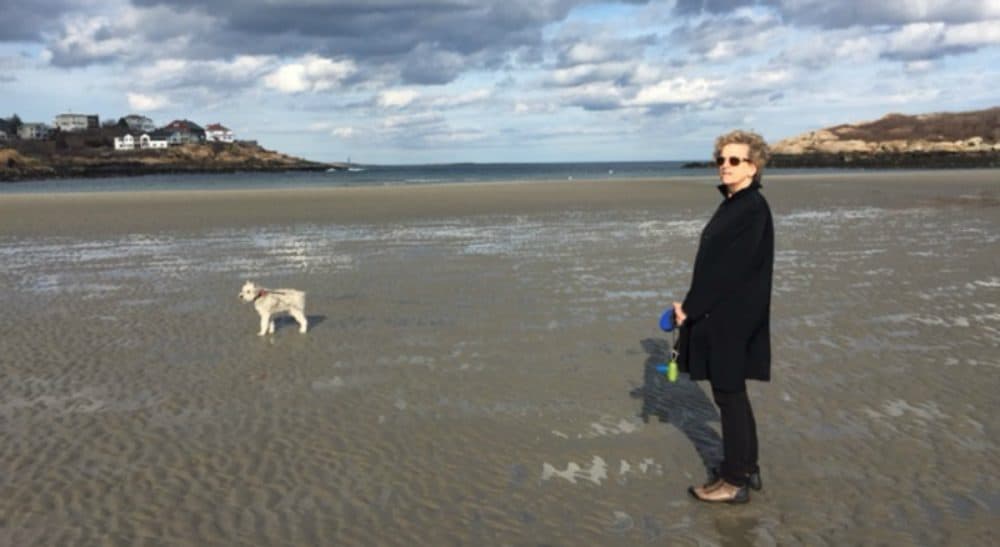Advertisement
Hounded By Grief: Contemplating Life After Buddy

I am dogless. Again.
Buddy was the third dog love of my life. A miniature Schnauzer of regal bearing (he walked on his toes) and a mellow soul, he accompanied me and mine for the past 13 years. I have been down this sad and lonely road twice before: first with Bartholemew the Beagle, who loved to roll in garbage, adored raisins and howled in perfect pitch along with the wail of every passing siren. Pom the Poodle was timid and sweet. He liked the crunch of a carrot and comforted my daughter through the trials of middle school and high school.
It’s bad form to admit to having a favorite child (this is not a problem for me since I have just the one) but I have no trouble telling you that Buddy was my bestie. He loved everyone — people and dogs. He wanted to say hi to everyone. Strangers would smile and say “Hi Buddy,” and when I told them Buddy was his name, they agreed it was apt.
No matter how loving your mate, no matter how huggy-kissy your kid, doglessness is a state of tactile deprivation.
Buddy has been one of the top 10 most popular names for male dogs since they started keeping that list. I’m sure we would have chosen something less common, but he was a year old when we got him and by then he already knew who he was.
He was my exercise machine and my writing partner. Our morning walks got me out of the house and moving; our strolls morning, noon and night were when I worked out plot lines and character traits. When asked about my writing “process,” Buddy was always part of the answer.
But living with a dog is not merely a means to an end.
Dogs correct existential imbalances that are genetically programmed into Homo sapiens. We humans have gaping, screaming, insatiable needs for affirmation and affection, not to mention constant gratification of our primary sense — which is touch. No matter how loving your mate, no matter how huggy-kissy your kid, doglessness is a state of tactile deprivation. Dogs never walk away from petting, patting, scratching or stroking. And even when you are momentarily sated, a dog will put his head in your lap and look up (eyes wet with adoration) for more.
Cats can be nice in this regard, too, I am told. But cats are far too dignified to actually shiver and drool in response to your touch. Canines are nearly as goofy as humans in this respect and they have the advantage of being shameless.
Advertisement
Dogs are not subtle. Dogs have no secrets. Dogs let everything hang out, waiting for the slightest indication that you’re ready to get down on the floor and play.
Doglessness means there is no guarantee that someone in the house will be in a good mood and that it is unlikely anyone will greet you at the door as you deserve to be greeted after a long, unappreciated day in the world — that is to say, with ardor, gratitude and unbridled joy.
I am keeping Buddy’s food and water bowls, and the paw-print container for biscuits. They await a successor because I know what’s good for me.
I know that getting a dog is a serious commitment. Like marriage, living with a dog is not all sweetness. Like kids, dogs are a pain in the neck. Frigid mornings and rainy nights do not excuse you from taking the dog out to do his or her business and of course. Vacations are more complicated. Worst of all, is the day you bring your dog to the vet for that last, terrible visit — and then return to very empty house. As Buddy declined, I noticed how often my Facebook page featured doggie obituaries and I’d tear up even when the “friend” was a complete stranger.
And yet, and yet … I am keeping Buddy’s food and water bowls, and the paw-print container for biscuits. They await a successor because I know what’s good for me.
Everything I ever needed to know I learned on the comics page, where you will find “Red & Rover,” a strip about a boy and his dog. In the first frame, Red sits in bed, reading to Rover “And they lived happily ever after.”
In a thought bubble, Rover asks, “How do we know for sure they lived happily ever after?
With the wisdom of the ages, Red replies, “My guess is that they always had dogs in their lives.”
